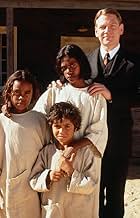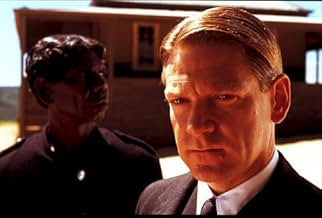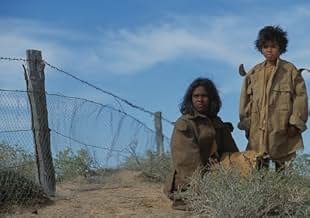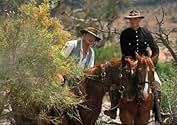IMDb RATING
7.4/10
31K
YOUR RATING
In 1931, three half-white, half-Aboriginal girls escape after being plucked from their houses to be trained as domestic staff, and set off on a journey across the Outback.In 1931, three half-white, half-Aboriginal girls escape after being plucked from their houses to be trained as domestic staff, and set off on a journey across the Outback.In 1931, three half-white, half-Aboriginal girls escape after being plucked from their houses to be trained as domestic staff, and set off on a journey across the Outback.
- Director
- Writers
- Stars
- Awards
- 23 wins & 25 nominations total
Lorna Lesley
- Miss Thomas
- (as Lorna Leslie)
- Director
- Writers
- All cast & crew
- Production, box office & more at IMDbPro
Featured reviews
This film has quite a few remarkable features. First of all is its title which is rather unusual and immediately grabs one's interest. Next there is the fence itself which runs for thousands of miles to protect what few green plants there are in these desert regions from the voracious appetites of millions of wild rabbits. This fence plays an important role in this true story. Then there is the diector who not only scoured the continent to find three suitable aboriginal girls to play theleads but moulded these inexperienced beginners into the believable characters of Molly, Daisy and Gracie. The director Phillip Noyce has achieved remarkable success in creating three good little performers and should be given full credit for his difficult task.
For those who do not know the desert regions of Australia, it must be said that the "outback" country is harsh and cruel and can only be crossed by those with experience...those with a knowledge of the land. I think the camera makes it clear that the hostile environment is very much like a fence in itself...almost impossible to cross. All the more remarkable therefore that these girls accomplished what they set out to do. May be it was a reckless decision they made but thanks to the fence they found their way back to family and friends.
The film is largely a record of the long trek and the manner in which the children are able to survive. There are not many dramatic moments on their journey south. The children are mainly concerned with avoiding the blacktracker who is following them. The most unforgettable scene comes early in the film when the children are forcibly torn from their mothers. This is truly heart-wrenching stuff.
This thoughtful presentation is worth watching. It is part of Australian history.
For those who do not know the desert regions of Australia, it must be said that the "outback" country is harsh and cruel and can only be crossed by those with experience...those with a knowledge of the land. I think the camera makes it clear that the hostile environment is very much like a fence in itself...almost impossible to cross. All the more remarkable therefore that these girls accomplished what they set out to do. May be it was a reckless decision they made but thanks to the fence they found their way back to family and friends.
The film is largely a record of the long trek and the manner in which the children are able to survive. There are not many dramatic moments on their journey south. The children are mainly concerned with avoiding the blacktracker who is following them. The most unforgettable scene comes early in the film when the children are forcibly torn from their mothers. This is truly heart-wrenching stuff.
This thoughtful presentation is worth watching. It is part of Australian history.
Official policy between 1910 and 1970 in Australia allowed half-caste Aborigine children to be forcibly removed from their families and incarcerated for their own' good in training schools where their were educated to become fitting servants for white families. This institutionalised eugenics, still recent enough to be remembered by its victims, is still a controversial issue in Australia where the PM John Howard refuses to give an official apology. The film has been doing very well in Australia. The story follows three such girls who are forcibly re-located but escape, and follow the rabbit-proof fence' on a 1500 mile journey back home. The title itself seems to echo not only the yellow brick road of the Wizard of Oz (another journey to reclaim one's wholeness) but the fence that was erected to contain animals which is just how the Aborigine children are treated, albeit with the best intentions. The story was adapted from a book by the daughter of the youngest surviving half-cast Aborigine portrayed in the film the actual child actors had mostly never seen a motion picture before let alone acted in one.
I've seen several movies recently ("Adaptation," "The Hours," "Bowling for Columbine," "City of God," etc.), and "Rabbit-Proof Fence" is the best of the bunch. It's a simple story, but a very moving one. In particular, the performances by the young leads, the beautiful cinematography, and the wise, uncluttered script made this a strong cinematic experience for me. Kenneth Branagh was convincing as the racial purity zealot who manages the whole forced removal scheme. I also really enjoyed the subtle changes we see in the mysterious character of The Tracker (played with wonderfully restrained power by David Gulpilil), as his dogged pursuit of the girls eventually gives way to a dawning admiration. And to cap it all off, the closing real-life footage and text postscript leaves the audience feeling simultaneously devastated and triumphant. Wow.
This is a very powerful film from the wonderful Phillip Noyce (The Quiet American) and its based on the shameful history in Australia where aborigine children were taken by force from their families and tribes to camps and taught to be servants. In the film 3 sisters escape and venture to walk 1,500 miles back to their tribe. The title refers to a fenceline that stretches for thousands of miles and the girls follow it. The wonderful aborigine actor David Gulpilil (Walkabout) plays a scout that is tracking the girls and Kenneth Branaugh plays an officer that is in charge of the whole operation. I guess the main flaw in the film would be the middle where most of the walking takes place and the film really slows down but its not a major complaint. The 1,500 mile trek is expertly paced and the film is by no means dull. Rather, its fascinating! The real footage that we see at the end of the film is so powerful that the whole essence of what you have just watched becomes even more devastating. This is more than just an important film, its a documentation of an ugly and shameful part of Australian history. A must see!
8=G=
Few films have garnered so much applause (from critics and public alike) with so little. The plot of "Rabbit Proof Fence" can be found elsewhere on this website. Suffice it to say it's about three girls walking and walking and walking and walking and....across some of the most visually austere country on the planet; the Aussie outback. There's little story behind the film, zilch for Hollywood tinsel, and a minimal cast of relative unknowns (except for Branagh's small role). It would be easy to make the case that this film is one long boring flick. However, it would also be easy to make the case it is a beautifully filmed story of courage, determination, and the triumph of the human spirit. I would argue the latter. (B+)
Did you know
- TriviaEverlyn Sampi (Molly Craig) ran away twice during filming. In one instance, she was found in a phone booth, trying to buy tickets back to Broome.
- GoofsThe three girls Molly, Gracie and Daisy were not taken by surprise and removed by force from Jigalong. The violent removal scene in the film is entirely fictional. The girls' mothers were informed beforehand they were to travel with Constable Riggs and, without any protest, they acquiesced in the decision. The girls left Jigalong on horseback, not locked in a motor car.
- Quotes
Daisy Kadibill: [after Molly lifts Daisy up to a bird's nest to gather some eggs to eat] Three of them!
Molly Craig: Perfect. One for you, one for me, and one for both of us!
- Crazy creditsThe painting songs sung by the Walpiri, Amatjere and Wangajunka women were not sacred songs, but were songs able to be performed in public.
- ConnectionsEdited from A Steam Train Passes (1974)
- SoundtracksNgankarrparni
(Sky Blue Reprise) (2002)
Written by Peter Gabriel
Featured by The Blind Boys of Alabama, Myarn Lawford (as Myarn) and Ningali Lawford
- How long is Rabbit-Proof Fence?Powered by Alexa
Details
- Release date
- Country of origin
- Official site
- Languages
- Also known as
- Rabbit-Proof Fence
- Filming locations
- Production companies
- See more company credits at IMDbPro
Box office
- Budget
- $6,000,000 (estimated)
- Gross US & Canada
- $6,199,600
- Opening weekend US & Canada
- $88,352
- Dec 1, 2002
- Gross worldwide
- $16,220,968
- Runtime1 hour 34 minutes
- Color
- Sound mix
- Aspect ratio
- 2.35 : 1
Contribute to this page
Suggest an edit or add missing content
































